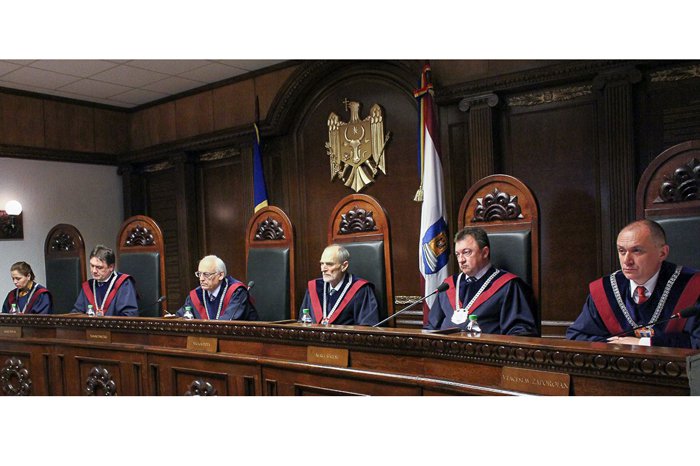Moldovan top court finds out that head of state has no veto right in appointing defence minister
18:25 | 17.10.2017 Category: Political
Chisinau, 17 October /MOLDPRES/ - The Constitutional Court (CCM) today considered a notification submitted by the government in last September. The Court ruled that the refusal by Moldovan President Igor Dodon to appoint the defence minister represents “temporary impossibility to exercise his powers and justifies the establishment of the position’s interim duties, which are ensured, consecutively, by the parliament speaker and the prime minister.”
According to judges’ decisions, in exercising his powers, provided for in the Article 98, paragraph 6 of the Constitution, Moldova’s president can refuse the prime minister’s proposal on appointment of a person to a vacant office of minister and ask him to make another proposal.
CCM decided that the president’s political will cannot represent a source of institutional blockage, on the one hand, and cannot cancel, on the other hand, the powers of the prime minister within the procedure of co-ruling in the government reshuffling. Thus, the Court found out that the president of Moldova has right to check the fitting of the candidate put forward by the prime minister for a position, but has no right to veto as to the PM’s proposal.
The CCM magistrates noted that, in Moldova’s constitutional architecture, the president must have a neutral role of arbitrator and not be a political player. The judges said that the deliberate refusal by the country’s president to fulfill his constitutional obligation to appoint the repeated proposal by the prime minister represents a serious violation of his constitutional duties and the oath – a circumstance which justifies the initiation by the parliament of the procedure of the president’s suspension, in line with the Article 89 of the Constitution.
At the same time, the Court noted that the mechanism of dismissal of the president deals with the parliament’s option; this is a complex and long-lasting procedure, which does not promptly settle the issue of full work of the fundamental institutions, deliberately obstructed by the president.
Thus, the Court ruled that, by the deliberate refusal to exercise one or more constitutional obligations, the president removes himself from their exercising. In this context, the Court considered that his deliberate inaction represents, according to the Article 91 of the Constitution, temporary impossibility, on subjective grounds (lack of wish) to exercise the concerned power, which justifies the establishment of the position’s interim duties, in order to ensure the exercising of this (these) constitutional obligations of the president.
According to the top court’s ruling, the establishment of the position’s interim duties, caused by the president’s deliberate refusal to fulfill one more constitutional obligations, is to be ascertained, in each case separately, by the Constitutional Court, following the notification of the subjects provided for in the Article 38, paragraph 1 and 2, letter (c) of the constitutional jurisdiction code, depending on their competence area.
The Constitutional Court’s ruling is final, cannot be subjected to any appeal, enters into force on the date of adoption and is published in the Official Journal (Monitorul Oficial) of Moldova.
The Moldovan president’s adviser on legal issues, Maxim Lebedinschi, criticized the CCM decision. Lebedinschi said the Court’s judges might be called to account for the ruling they had issued.
(Reporter A. Zara, editor M. Jantovan)

